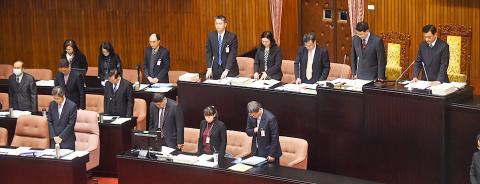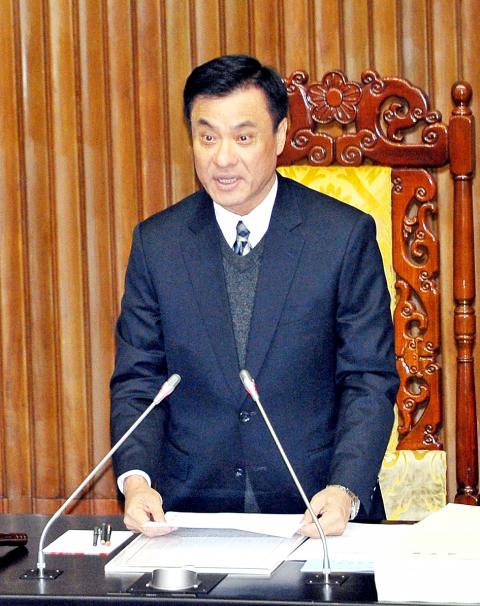The new legislative plenary session opened yesterday, with the Chinese Nationalist Party (KMT), reduced to a minority party after its election rout, blocking draft bills on “ill-gotten party assets” proposed by the Democratic Progressive Party.
The session commenced with Legislative Speaker Su Jia-chyuan (蘇嘉全) leading the legislature and Executive Yuan officials in observing a moment of silence for those who lost their lives in Tainan in the earthquake that struck on Feb. 6.
More than 100 draft acts sailed through their first readings and were referred to legislative committees for review and deliberation during the morning meeting, including draft bills on governing political parties; amendments to the Referendum Act (公民投票法) and the Disaster Prevention and Protection Act (災害防救法); setting up reciprocal offices with China; and the much-discussed legislation on the presidential transition of power.

Photo: Liu Hsin-de, Taipei Times
What did not get through were four bills aiming to deal with ill-gotten party assets proposed by DPP lawmakers, which the KMT caucus opposed and were sent back to the Procedure Committee.
KMT caucus whip Lin Te-fu (林德福) said the regulation of political parties’ assets could be included in the proposed political party act, adding that the KMT opposed the DPP’s bills because they are “apparently targeting [the KMT].”
DPP Legislator Su Chih-fen (蘇治芬) blasted the KMT’s move on Facebook, saying the KMT “still does not understand why it has been spurned by the public even after its 2014 and 2016 electoral routs.”

Photo: CNA
“The political party act is to ensure a fair playing field for all political parties, and the premise for that fairness depends on the act governing ill-gotten party assets stripping away the competitive advantage that the KMT has held for a long time,” Su Chih-fen said.
The DPP, which now holds a majority in the legislature, can choose to counteract the KMT’s move if it is “determined to propose the bill,” Social Democratic Party spokesperson Miao Po-ya (苗博雅) said, adding that according to legislative regulations, a caucus can only block the referral of a bill to a committee when “there are too few lawmakers present to conduct a vote.”
“In other words, if the DPP appoints a sufficient number of lawmakers to attend the first-reading meeting ... the bills could be successfully referred to the committee for review,” Miao added.
Meanwhile, Lin said prior to the general assembly meeting that the KMT caucus does not and would not oppose legislation on the transition of power, but the legislation must not be unconstitutional.
The draft act will not be reviewed until at least the end of next month or the beginning of April after a question-and-answer session, “so the third reading will probably be completed only after the [May 20] presidential transition,” he said.
“Since the proposed bill will not be in effect for this transition, we should take time to review the bill. The most important thing is not to ensure that it does not go against the Constitution, as the version proposed by [the DPP] does in some parts,” Lin added.
KMT Legislator Alicia Wang (王育敏) said the DPP’s version of the legislation, which would restrict the incumbent president’s appointment and decisionmaking powers, would generate controversies, and that since a president is elected to a full four-year term, resigning before their time is up or reducing their effective ruling time is unlawful.
DPP Legislator Wu Ping-jui (吳秉叡) disagreed, asking why “the KMT, when it proposed its version of the presidential transition bill in 2008, which was little different from the one we have now, did it not find it unconstitutional?”

Tropical Storm Gaemi strengthened into a typhoon at 2pm yesterday, and could make landfall in Yilan County tomorrow, the Central Weather Administration (CWA) said yesterday. The agency was scheduled to issue a sea warning at 11:30pm yesterday, and could issue a land warning later today. Gaemi was moving north-northwest at 4kph, carrying maximum sustained winds near its center of up to 118.8kph and gusts of 154.8kph. The circumference is forecast to reach eastern Taiwan tomorrow morning, with the center making landfall in Yilan County later that night before departing from the north coast, CWA weather forecaster Kuan Shin-ping (官欣平) said yesterday. Uncertainty remains and

SEA WARNING LIKELY: The storm, named Gaemi, could become a moderate typhoon on Wednesday or Thursday, with the Taipei City Government preparing for flooding A tropical depression east of the Philippines developed into a tropical storm named Gaemi at 2pm yesterday, and was moving toward eastern Taiwan, the Central Weather Administration (CWA) said. Gaemi could begin to affect Taiwan proper on Tuesday, lasting until Friday, and could develop into a moderate typhoon on Wednesday or Thursday, it said. A sea warning for Gaemi could be issued as early as Tuesday morning, it added. Gaemi, the third tropical storm in the Pacific Ocean this typhoon season, is projected to begin moving northwest today, and be closest to Taiwan on Wednesday or Thursday, the agency said. Today, there would likely

DISRUPTIONS: The high-speed rail is to operate as normal, while several airlines either canceled flights or announced early departures or late arrivals Schools and offices in 15 cities and counties are to be closed today due to Typhoon Gaemi, local governments announced last night. The 15 are: Taipei, New Taipei City, Taoyuan, Tainan, Keelung, Hsinchu and Kaohsiung, as well as Yilan, Hualien, Hsinchu, Miaoli, Chiayi, Pingtung, Penghu and Lienchiang counties. People should brace for torrential rainfall brought by the storm, with its center forecast to make landfall on the east coast between tonight and tomorrow morning, the Central Weather Administration (CWA) said. The agency issued a sea warning for the typhoon at 11:30pm on Monday, followed by a land warning at 11:30am yesterday. As of

CASUALTY: A 70-year-old woman was killed by a falling tree in Kaohsiung as the premier warned all government agencies to remain on high alert for the next 24 hours Schools and offices nationwide are to be closed for a second day today as Typhoon Gaemi crosses over the nation, bringing torrential rain and whipping winds. Gaemi was forecast to make landfall late last night. From Tuesday night, its outer band brought substantial rainfall and strong winds to the nation. As of 6:15pm last night, the typhoon’s center was 20km southeast of Hualien County, Central Weather Administration (CWA) data showed. It was moving at 19kph and had a radius of 250km. As of 3pm yesterday, one woman had died, while 58 people were injured, the Central Emergency Operation Center said. The 70-year-old